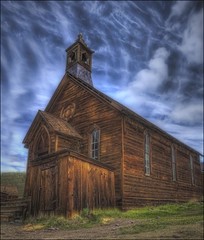 Image by Hot Flash Photography via FlickrThe United Methodist Church is a "connectional" church. We are connected together into some semblance of a "whole"--even with all of the known differences that divide us into factions and competing interests. We're divided theologically. We're divided racially. We're divided nationally. We're divided regionally. And, really, that's to be expected. Our various perspectives shape who it is that we are and what it is that we believe and, therefore, what our vision is for this thing we call "The United Methodist Church"--our peculiar embodiment of Christ in the world.
Image by Hot Flash Photography via FlickrThe United Methodist Church is a "connectional" church. We are connected together into some semblance of a "whole"--even with all of the known differences that divide us into factions and competing interests. We're divided theologically. We're divided racially. We're divided nationally. We're divided regionally. And, really, that's to be expected. Our various perspectives shape who it is that we are and what it is that we believe and, therefore, what our vision is for this thing we call "The United Methodist Church"--our peculiar embodiment of Christ in the world.
In the Western Jurisdiction, that spreads from Colorado and Wyoming, down to Arizona then to the coast and all the way up to Alaska, we have a reputation of being one of the more liberal segments of the whole body of the United Methodist Church. That comes, mostly, from our vocal support of gay and immigrant rights. Let me be clear, we're not all of one mind here and it's hard to speak with one voice. Just like, politically, there really are no "red" or "blue" states but really just a bunch of purple states. So, too, in the West, we have to deal with a bunch of diversity among our members.
I'm just came back from San Francisco where I met with other leaders from our Western Jurisdiction to talk about issues relating to hospitality and episcopal support and youth and Korean congregations and Volunteers in Mission…a whole lot of stuff. And, while our task was somewhat unclear (which, in itself is an "unclear" statement) we could hear perspectives bubble up to the surface trying to define what it is that we believe about the saving message of Christ and what it is that the Western Jurisdiction has to offer the WHOLE CHURCH.
Sometimes it's hard to look at a system when you're standing right inside of it. Sometimes it's hard to have any sense of perspective when your eyes already see that which you have around you. And so it is as we look and pray and discern what it is that we have to say and how it is that we need to say it and do it in the world.
So what is it that we have to offer.
We can offer our diversity. The West is, perhaps, the most diverse of our Jurisdictional Conferences…at least in the US. And that diversity can shape how it is that we work alongside our brothers and sisters in other parts of the world where the United Methodist Church…as we become more diverse as an entire denomination.
We can offer our hospitality. There are many within our Jurisdiction that wish we would be more hospitable to homosexuals. That's the big issue that comes up concerning hospitality and welcoming. But, we need to be aware that we can offer a perspective that, outside of homosexuality, is welcoming of persons of differing perspectives. Even among our clergy, we are not of one mind. That's a good thing.
We an offer experience and guidance on some social issues that may affect the West more than other areas. In particular, we can offer leadership and guidance on what ministries to and with immigrants looks like. I know that our point of view, which, as The United Methodist Church in the West, is probably more welcoming and "liberal" than many would like. However, there is a value to this that I think we need to offer.
We can offer a more obvious post-Christian or secular environment. Hey, we're not the Bible Belt over here. And some of the issues that we face are really growing edges for other Jurisdictions. We are are on the cutting edge of what Christian ministry looks likes when our primary method of introduction is not "Where do you go to church?"
We can offer a lot of creativity. We're used to doing things differently and, perhaps, have fewer organizational "sacred cows."
Then again, it's hard to look at our own system when we're standing right in the middle of it. But, in part, that's just what we've done. Here we have persons in the West saying what the West has to offer.
About Me
Search
My Blogroll
Popular Posts
- Best Description of Tom Waits' Voice
- Needing Something Bigger
- When Benchmarks Become the Goal -- A Pedometer Parable
- Disturb Us, Lord -- A Prayer By Francis Drake
- Rob Bell in My Inbox (And Maybe in Hell, Too)
- A Definition of Preaching -- It's Like a Bullet
- A Hymn for Palm Sunday -- From Chaplain Mike over at iMonk
- Don't Sanitize Rev. Dr. Martin Luther King
- Loving Enemies -- Quote from Klyne Snodgrass
- "Jesus of the Scars" -- Good Words for Lent



0 comments
Post a Comment